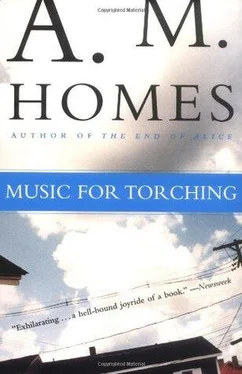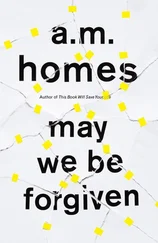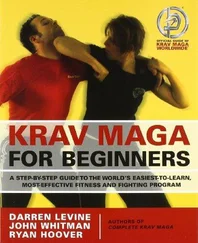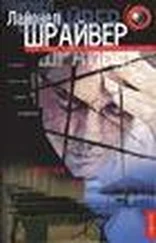"Let's go upstairs and leave the big things to the boys," Pat says.
"They sure knew how to build 'em," Paul says, showing George the hole in the dining room wall. "If it was new," he says, "you can bet the whole thing would have gone up like a wad of paper, but these old ones, they're built to last."
"Smoke damage," Elaine says, opening the closet doors. "Everything stinks."
"Spring cleaning," Pat says, opening windows. "Make the best of the worst. Make two piles-one to go to the dry cleaner and one to give away. Remember, tax deductions for donations. My golden rule: If you didn't wear it this year or last, you certainly won't wear it next."
"Give it away," Elaine says in a sudden burst of enthusiasm. "Give it all away." She begins pulling things out of the closets and throwing them onto the king-size bed. And then she is down on her knees digging through old shoes, flinging them out behind her, pair after pair. "If the shoe fits, wear it," she says. "These never fit, none of these ever fit, fucking shoes, fucking everything."
Pat Nielson, stunned by Elaine's enthusiasm, her newfound freneticism, picks a navy Dior dress out of the pile. "When did you get this?" she asks.
Elaine stands, takes the hanger from Pat, and presses the dress against herself. "Just after we moved in, first cocktail party. I paid more for this dress than for any since. Fifteen years," she says. "It's a lifetime." And her hand goes to her throat as though she can silence herself by choking herself. She drops the dress back on the bed and turns away, overcome. "I'll never wear it again. It's a six, and I'm not even an eight anymore, more like a ten."
"You can't collect everything," Pat says, putting the dress in with the giveaways. "Life is not a hobby."
Elaine moves to take down the curtains. At first she is gentle with the rod, but then she yanks, harder, ripping the brackets out of the wall. "I hate these. I don't even want to clean them, I want to burn them," she says.
The windows are curtainless, the closets half empty, the drawers half full. Elaine is throwing away the past, the weight of it. What's left is only what's necessary, what they need to live right now, today.
Pat carries load after load downstairs. Elaine stays upstairs. She looks out the front window and sees Mrs. Hansen arranging things on the lawn, the broken candlesticks, her Dior dress, the boys' baby clothes. Embarrassed, Elaine hurries down to stop her. The house is filled with people-a fireman stands blocking the hallway, talking to Paul. What is Paul saying? Elaine imagines him telling the fireman, My wife did it. She didn't feel like cooking. There were hot dogs in the freezer, but instead of grilling them she decided to grill the house, to burn it down.
"Excuse me," she says, pushing past Paul, out the front door and into the yard.
The sun is high, the grass richly green. Mrs. Hansen has arranged things in neat rows like departments: men's, women's, boys', and household.
A stranger walking by turns to Elaine and says, "Fine idea. It's a beautiful day for a tag sale."
A woman picks up one of Elaine's old sweaters and holds it against herself. "What do you think?" the woman asks. "Is it me?" And before Elaine can answer, she continues, "I'll give you seven dollars for it? Enough?"
Elaine nods.
"Why don't we spread out the rest?" Mrs. Hansen suggests.
Why not?
Elaine goes back into the house. In the living room there's an end table that she hates, and a lamp, and then there's Daniel's broken toy chest, the old TV, and the love seat that used to be in the den.
"Can you give me a hand?" she asks a man she's never seen before.
"Sure," he says, helping her bring things out. "Here, let me get it, you go on ahead and open the door."
"I didn't feel like cooking," Elaine tells Mrs. Hansen, who, in addition to doing a brisk business at the yard sale, has found time to make another pot of coffee.
"That's the beginning and the end," Mrs. Hansen says, raising the pot. "Refill?" she asks.
"I lost my cup," Elaine says.
"No matter," Mrs. Hansen says, taking one off the dollar table and filling it. "Anyone else for coffee, fresh cup? There's a great Dior dress on aisle three," she tells someone.
"What size?" a woman asks.
"Six."
Daniel and Sammy stand by the maple tree drinking mugs of Mrs. Hansen's French roast.
"Isn't there anything else?" Elaine asks them. "No juice."
They shake their heads, rest their mugs by the roots of the tree, and take off, chasing each other around the yard.
"That can't be good for you," Elaine calls after them.
Friends and neighbors mill around, rubbernecking. "Terrifying," they say. "The flames were taller than the trees." They're frightened because as far as they're concerned it was an accident, an act of God, something that could happen to anyone at any time, no warning. And simultaneously they're relieved because it's not their house, it's not their stuff spread out on the grass, it didn't happen to them. Relief fills them with advice, ideas for renovation and redecoration. They go through the house pointing out the possibilities. "You could put in an island, a Subzero, more cabinets-there's no such thing as too much storage." A postmodern barn raising, the neighbors come bearing the names and numbers of contractors, carpenters, plumbers, and painters.
Elaine looks at Paul; he seems to be taking it all in his stride. Enjoying himself, soaking up the attention.
Henry arrives in tennis whites and stares at the blackened edge of what used to be the living room wall. "Oh, oh," he says. "This is a nightmare. What happened? Don't tell me." His brow furrows. "Bomb?" he asks, and Paul shakes his head. "Hot-water heater?" Again, Paul shakes his head. Henry sweeps his racket through the scorched grass. The racket goes ka-thunk against something. Henry bends, plucking the can of starter fluid from the night before out of the grass with his free hand. "Dangerous," he says. "This is a four-hundred-dollar racket."
Paul's heart has stopped. He puts his hand to his chest and bangs. He does self-start CPR. He bangs and then he coughs. He clears his throat. He breathes. Paul is looking at the can in Henry's hand, thinking that now it has fresh prints, Henry's prints. If the investigator isn't happy with Paul and Elaine's story, Paul can always finger Henry. He coughs again, correcting the irregular rhythm of his heart.
"Choking?" Henry asks.
"Cinder."
"We had a date, a plan for a game?" Henry says, shaking the can; it's empty. He carries it to the trash and deposits it.
"The house burned down," Paul says, as though Henry can't possibly understand the responsibility involved.
Daniel and Sammy run by, trailing endless ribbons of cassette tape. "We're tying up the house," Daniel says.
"Holding it hostage," Sammy screams and then asks, "What's hostage?"
And Paul thinks of the yellow ribbon, the crime scene tape, the song, and still can't remember what it's all about.
"We've already gone around twenty-three times, haven't you noticed? Haven't you seen us?"
Henry's cell phone rings in his back pocket. He ignores it.
"Hey," Daniel says, running around again. "Hey, Henry, your butt's calling you, aren't you going to answer it?"
"It's her," Henry tells Paul, and immediately Paul knows it's the date. "She's the only one who has the number."
The phone stops ringing and then starts again. Henry takes the phone out of his pocket and hands it to Paul. "You talk to her," Henry says. "I think she likes you better."
Paul takes the phone. He turns away. He stands in the yard talking softly-it's like urinating in public, you try to be discreet. "Hello?"
"What are you wearing?" the date asks.
"Same as yesterday," Paul says, wondering if the date knows that it's him, not Henry.
Читать дальше












